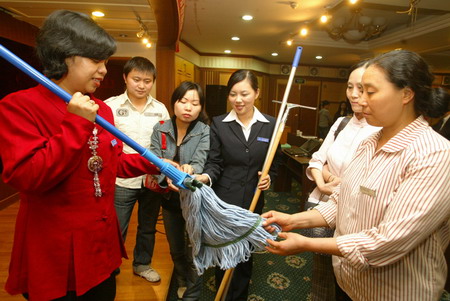Economy
Demand for Filipino maids on the rise
By Karen Yip (China Daily)
Updated: 2010-11-08 09:27
 |
Large Medium Small |
|
 |
|
A Filipina maid, only identified as Joy, teaches Chinese maids how to clean a room with various implements during a housework demonstration in Sichuan province, one of the major regions providing housemaids for Chinese families across the country. [Photo/ China Daily] |
However, unscrupulous agents are capitalizing on the popularity and demand for Filipina maids by word-of-mouth to wealthy Chinese families. They acquire visas using false documentation.
It is estimated that 75 percent of "hidden incomes" belong to those in the high-income category, which covers more than 2,000 urban families across the country. As personal incomes rise, the demand for domestic services will also increase, as is already evident.
"We have been telling our nationals that the domestic maid market is technically closed. Given the sheer number of people in China, we understand that the Chinese have to protect their labor market," said Noel Novicio, spokesman at the Philippine Embassy in Beijing when contacted by China Daily.
Based on registration at the embassy, there are 100,000 Filipinos currently residing in China. Out of this, 100 are in Beijing.
The Philippine government is working with the Chinese authorities to implement domestic labor laws and prevent foreign workers from becoming victims of scams or of their own ignorance.
"The market is experiencing a tight labor shortage. Because of this, the salaries for maids have increased. The Filipina maids fill a gap in the Chinese maid market," said Professor Zhao Yaohui, a specialist on labor economics at the China Center for Economic Research, Peking University.
"There is no stigma associated with being a maid in the Philippines and among the Filipinos. In fact, being a maid is a professional job. But it's a different story in China."
Women from China's rural areas, who usually take up jobs as maids, are abandoning the occupation to pursue better opportunities in the factories, she said.
"Society imposes a negative image of the maids. It is seen as unglamorous to be a maid and it's a lowly paid job."
The International Labor Organization (ILO) in Beijing said the Chinese government has identified domestic work as a growth sector and is developing policies not just to promote employment but also to ensure the protection of domestic workers.
"Where there is a demand that cannot be met by the national workforce, opportunities for legally recruiting and employing a migrant worker should be considered," said Chen Qiaoling, an officer at the ILO in Beijing.
At the same time, domestic workers in China should have access to training opportunities and greater protection under the law to ensure a professionalization of the sector, he said.
"Many Filipino domestic workers are in diplomatic households. There are also those who work in households of international business professionals. It is expected that they move with their employers on the employers' foreign assignments.
"With China now an important center for international diplomacy and business, granting legal entry and work permits for diplomatic households is commonplace. It would be natural then to see more Filipino domestic workers in China as there are in New York and in Geneva," Chen said.
"I don't think China needs to import labor from other countries at this stage of its development," said Professor Pradeep Taneja from the School of Social and Political Science at the University of Melbourne.
If already there are significant numbers of Filipino domestic workers in China, then the Chinese government has to make sure that they are treated fairly and not subjected to physical or psychological abuse as has often been reported from other countries in the region where large numbers of Filipina female workers are employed, he said.
Du Juan contributed to the story




